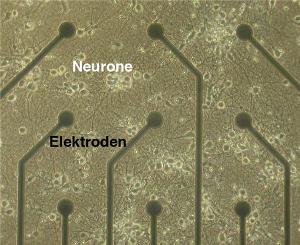Oct 7 2014
Tiny vesicles containing protective substances which they transmit to nerve cells apparently play an important role in the functioning of neurons. As cell biologists at Johannes Gutenberg University Mainz (JGU) have discovered, nerve cells can enlist the aid of mini-vesicles of neighboring glial cells to defend themselves against stress and other potentially detrimental factors.
These vesicles, called exosomes, appear to stimulate the neurons on various levels: they influence electrical stimulus conduction, biochemical signal transfer, and gene regulation. Exosomes are thus multifunctional signal emitters that can have a significant effect in the brain.
 Cultivated neurons on a multielectrode array chip: the electrodes register the electrical impulses of the neurons. (photo/©: Institute of Physiology, Mainz University Medical Center)
Cultivated neurons on a multielectrode array chip: the electrodes register the electrical impulses of the neurons. (photo/©: Institute of Physiology, Mainz University Medical Center)
The researchers in Mainz already observed in a previous study that oligodendrocytes release exosomes on exposure to neuronal stimuli. These exosomes are absorbed by the neurons and improve neuronal stress tolerance. Oligodendrocytes are a type of glial cell and they form an insulating myelin sheath around the axons of neurons. The exosomes transport protective proteins such as heat shock proteins, glycolytic enzymes, and enzymes that reduce oxidative stress from one cell type to another, but also transmit genetic information in the form of ribonucleic acids.
"As we have now discovered in cell cultures, exosomes seem to have a whole range of functions," explained Dr. Eva-Maria Krämer-Albers. By means of their transmission activity, the small bubbles that are the vesicles not only promote electrical activity in the nerve cells, but also influence them on the biochemical and gene regulatory level. "The extent of activities of the exosomes is impressive," added Krämer-Albers. The researchers hope that the understanding of these processes will contribute to the development of new strategies for the treatment of neuronal diseases. Their next aim is to uncover how vesicles actually function in the brains of living organisms.
The study was conducted in cooperation with the group of Professor Heiko Luhmann at the Institute of Physiology at the Mainz University Medical Center and bioinformaticians from the Institute of Molecular Biology (IMB) in Mainz.